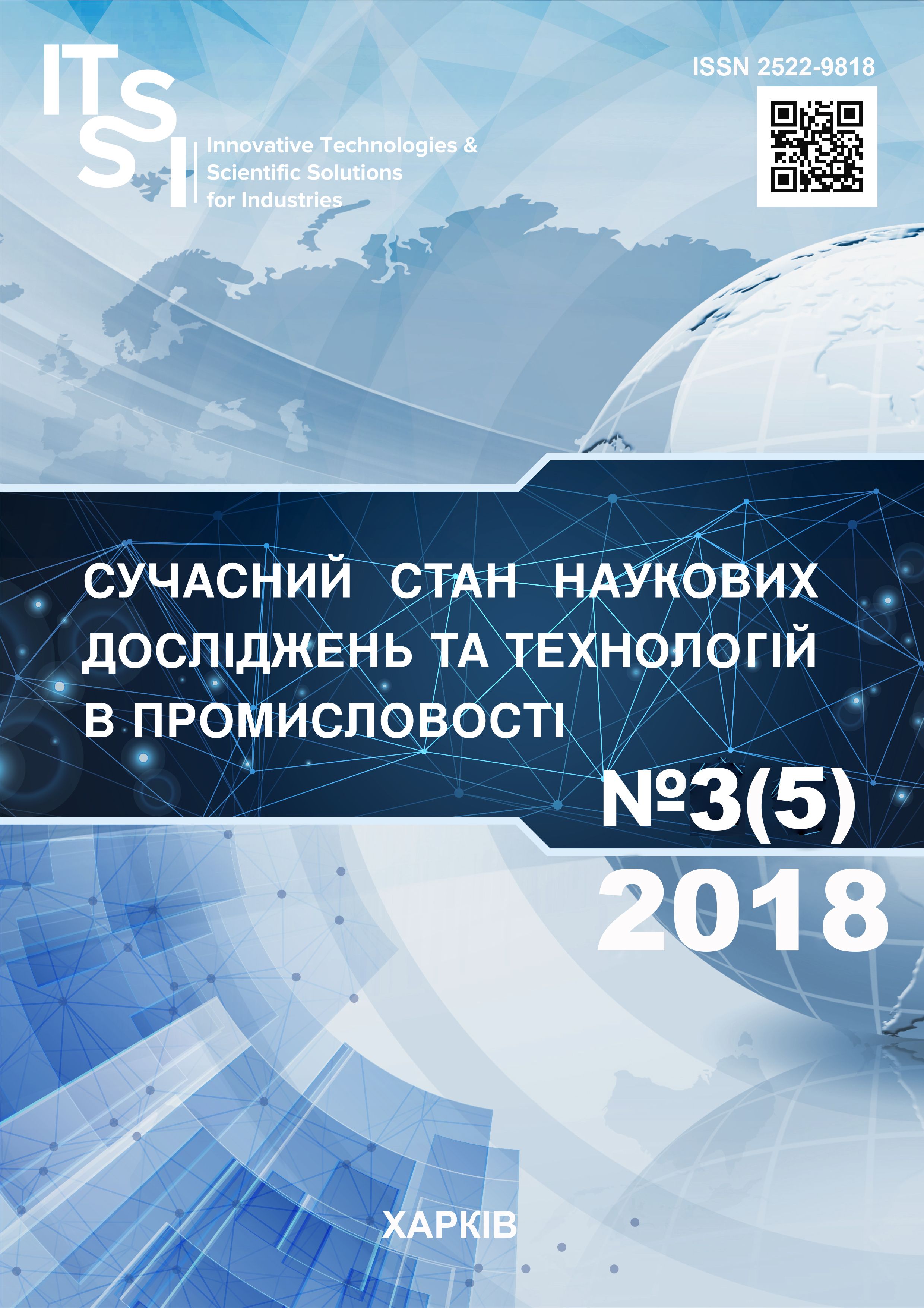LOGISTICS AT AN ENTERPRISE: THE PECULIARITIES OF PROCUREMENT ACTIVITIES
DOI:
https://doi.org/10.30837/2522-9818.2018.5.141Keywords:
logistics, purchasing, suppliers, competent suppliers, procurementAbstract
The object of the study is logistic activity at an enterprise. The subject of the study is theoretical conceptions, methods, methodological approaches to the management of logistic activities of the whole enterprise and procurement activities in particular, as an important part of logistics under modern conditions of the competition increase in product markets. The goal of this article is to develop the theoretical conceptions of the logistics of procurement activities to specify major categories and classifications. The main objectives of this article are to specify procurement activities, their tasks and classification; to specify factors that affect logistics and procurement; to improve the classification of the major types of procurement activities; to determine whether the features of the classification correspond to the types of relations between suppliers and sellers; to draft proposals for using procurement as a methodology for managing suppliers within competitive procurement. The main research methods are analysis, synthesis, the structural and logical analysis that enables solving the set tasks. Results. The procurement activity is specified and considered as the actions of an enterprise with competent suppliers of goods and services that are necessary to meet the effective demand of ultimate customers for products whose success is based on building relations with suppliers who can provide better management results, conditions and expected consequences of the cooperation. The feasibility of practical use of the additional classification criterion "the value of relations" is proved, according to which the following types of procurement activities are identified: periodic or nonrecurring, partnership and integrated ones. The introduction of the additional classification criterion requires extending the classification of suppliers according to their attractiveness to supply conditions and consequences which provide the different value of relations of enterprises with suppliers. Conclusions. It is proved that suppliers should be singled out into three groups – low, medium and highly attractive ones, which corresponds to different values of relations that they can provide. Therefore, the classification criterion "the value of relations" should be applied to the types of relations between industrial enterprises and suppliers, and periodic (nonrecurring), partnership and integrated relations should be selected. They differ in grouping partnership relations into 3 types - insourcing/outsourcing, vertical/intersectoral and integrated according to the qualitative mean level of attractiveness of suppliers. It is proved that to develop effective relations within the purchasing process, an effective tool is the methodology of procurement, which involves using practical methods and techniques that enable maximizing the interests of an enterprise within competitive trades.References
Korol’, A. N., Yeliseyev, A. Ye. (2008), "The main trends in the development of procurement activities" [Osnovnyye tendentsii v razvitii zakupochnoy deyatel’nosti], Izvestiya Irkutskoy gosudarstvennoy ekonomicheskoy akademii, No. 2, P. 13–15.
Laysons, K., Dzhillingem, M. (2005), Procurement and supply chain management [Upravleniye zakupochnoy deyatel’nost’yu i tsep’yu postavok], Moscow : INFRA-M, 794 p.
Krykavskyy, Ye. V., Patora, R. et al. (2006), "Lohistyka: tradytsiyni ta netradytsiyni sfery vykorystannya" ["Logistics: Traditional and non-traditional uses"], Herald of the National University Lviv Polytechnic University : Logistics, No. 552, P. 24–29.
Medzhybovskaya, N. S. (2011), Formation of systems of electronic supply of industrial enterprises [Formuvannya system elektronnoho postachannya promyslovykh pidpryyemstv], Odessa : Palmyra, 272 p.
Moroz, O. V., Muzika, O. V. (2007), System factors of the efficiency of the logistic concept of supply at the enterprises : monograph [Systemni faktory efektyvnosti lohistychnoyi kontseptsiyi postachannya na pidpryyemstvakh : monohrafiya], Vinnytsya : UNIVERSUM-Vinnitsa, 448 p.
Pis’mak, V. O. (2010), "Management of the procurement activity of the enterprise for the marketing-logistic concept" ["Upravlinnya zakupivelʹnoyu diyalʹnistyu pidpryyemstva za marketynhovo-lohistychnoyu kontseptsiyeyu"], Marketing and logistics in the management system : international scientific and practical conference, Lviv, P. 388–389.
Sisoev, V. V. (2011), Mechanism of logistic management of material and technical provision of institutes of the state security sector : theory, methodology and modeling: monograph [Mekhanizm lohistychnoho upravlinnya materialʹno-tekhnichnym zabezpechennyam instytutiv sektoru bezpeky derzhavy : teoriya, metodolohiya ta modelyuvannya : monohrafiya], Kharkiv : Vyd. KHNEU, 312 p.
Chubala, A., Viktor, Ya., Nestruy, R. et al. (2007), Transformation of value in the development of the relations "enterprise-client" : monograph [Transformatsiya vartosti u rozvytku vidnosyn "pidpryyemstvo-kliyent" : monohrafiya], Lviv : Publishing House of Lviv Polytechnic National University, 250 p.
Crosby, L. A., Evans, K. A., Cowles, D (1990), "Relationship Quality in Services Selling : An Interpersonal Influence Perspective", Journal of Marketing, Vol. 54, No.3, P. 68–81.
Wilson, R. M. S., Gilligan, C. (2005), Strategic marketing management : planning, implementation and control, Butterworth-Heinemann, 867 p.
Chekh, N., Vinnyk, I. (2017), "|Regulatory environment of business activities in Ukraine", Innovative Technologies and Scientific Solutions for Industries, No. 1 (1), P. 124–129. DOI: https://doi.org/10.30837/2522-9818.2017.1.124.
Downloads
Published
How to Cite
Issue
Section
License
Copyright (c) 2018 Olena Iastremska

This work is licensed under a Creative Commons Attribution-NonCommercial-ShareAlike 4.0 International License.
Our journal abides by the Creative Commons copyright rights and permissions for open access journals.
Authors who publish with this journal agree to the following terms:
Authors hold the copyright without restrictions and grant the journal right of first publication with the work simultaneously licensed under a Creative Commons Attribution-NonCommercial-ShareAlike 4.0 International License (CC BY-NC-SA 4.0) that allows others to share the work with an acknowledgment of the work's authorship and initial publication in this journal.
Authors are able to enter into separate, additional contractual arrangements for the non-commercial and non-exclusive distribution of the journal's published version of the work (e.g., post it to an institutional repository or publish it in a book), with an acknowledgment of its initial publication in this journal.
Authors are permitted and encouraged to post their published work online (e.g., in institutional repositories or on their website) as it can lead to productive exchanges, as well as earlier and greater citation of published work.














